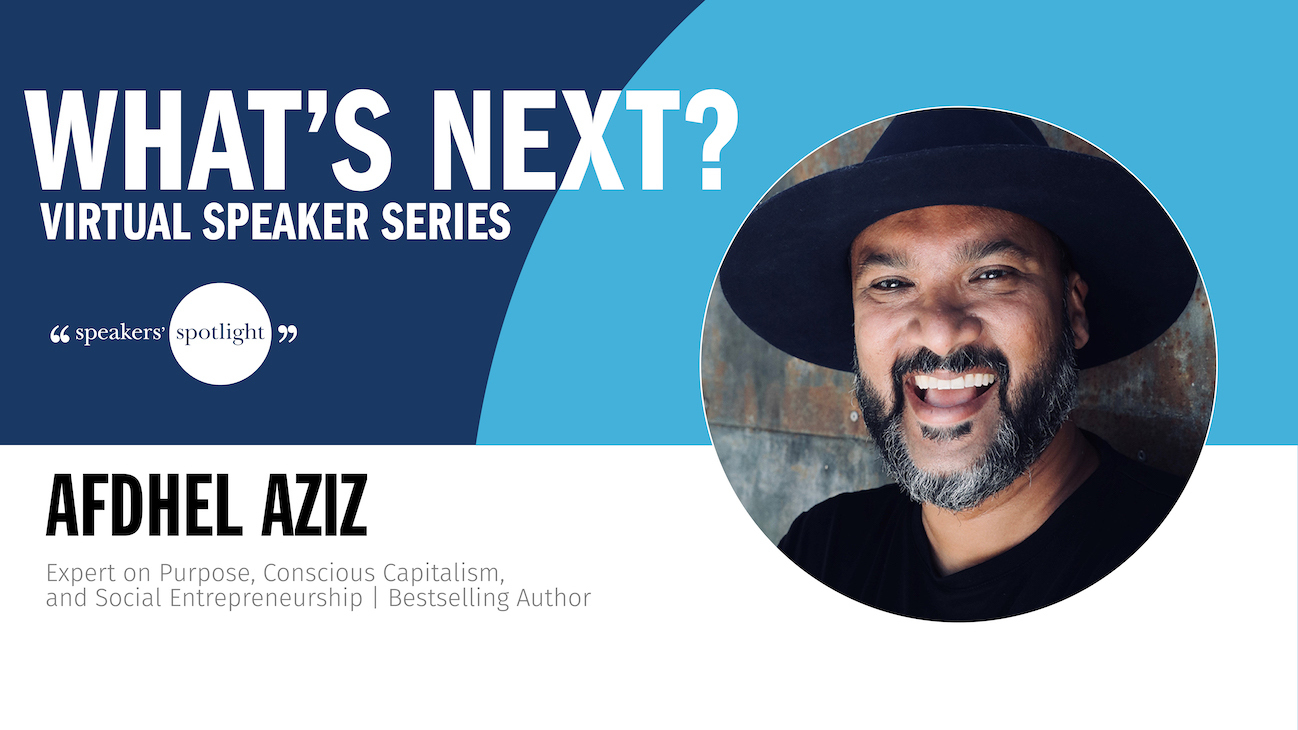There is stiff competition out there for talent right now with a looming employee shortage being an unexpected result of the global pandemic. COVID-19 caused many to re-evaluate and reflect on their purpose, leading to an exodus of talent looking for more from their careers. How can employers counteract this? By leaning into the power of purpose.
We were joined for this week’s edition of our Virtual Speaker Series by Afdhel Aziz, an expert of purpose, conscious capitalism, and social entrepreneurship, who has become one of the most inspiring leaders in the global movement of business as a force for good.
Drawing on examples from his new book, co-authored with Bobby Jones, Good is the New Cool: The Principles of Purpose, Afdhel walked us through how purpose, when executed properly, can future-proof any organization by transforming them into forces for good and growth, resulting in talent engagement and retention as well as increased consumer loyalty.
The Power of Purpose
There are three tectonic shifts affecting companies today and driving the need for purpose:
1) The Rise of the Conscious Consumer
A June 2020 Zeno study found that when consumers think a brand has a strong sense of purpose, they are:
- 4 times more likely to purchase from them;
- 6 times more likely to defend the company in the event of a misstep or public criticism;
- 5 times more likely to champion the company;
- And 4.1 times more likely to trust the company.
Research has shown that brands recognized today for their high commitment to purpose have grown more than twice the rate than those who are not.
2) The Rise of the Activist Employee
Purpose alongside a paycheck is the new normal for today’s workforce, with nearly 64% of US millennials saying they will not take a job if the employer doesn’t have a strong corporate social responsibility; and 85% of Gen Z employees saying that they believe companies have an obligation to help social problems.
These are the same young people protesting social injustice on the streets, so why would they stop protesting the minute they walk through the front door of your office, Afdhel asks. They want to bring their full selves to their work, which means they have high expectations of the companies they work for.
If you want to future-proof your talent for the next two generations, Afdhel says, you have to make sure that they see how their work means something beyond a quarterly profit goal.
3) The Rise of Impact Investing
ESG (Environmental, Social, and Governance) investing has become the mainstream, with 85% of investors saying ESG factors in their investment plan. It’s estimated that by 2025 ESG funds will be worth $25 trillion.
Purpose, Afdhel said, is the new digital. These tectonic shifts listed above are happening in much the same disruptive way as the arrival of digital 10 years ago.
“This is why we really preach to companies, ‘you need to get ahead of this, you need to address this as a competitive edge or watch your competition embrace it and fly right by you,’” Afdhel said.
Establishing Your Organizational Purpose
Some of the best companies in the world today have purpose in common. This includes Patagonia, Google, Disney, Apple, Microsoft, Ikea, LEGO, and many more leading brands.
Through researching and working with these companies, Afdhel developed what he calls “The Purpose Flywheel”, flywheel in this case meaning a continuous cycle of business growth that uses momentum from positive interactions for sustainable growth.
Stage 1: Lead with purpose. Have a clear purpose to inspire senior and leadership teams. It should be a simple statement that explains what the world needs and what your company is uniquely positioned to create.
Stage 2: Work with purpose. Educate, inspire, and empower employees to contribute their gifts and passions in service to the purpose.
Really successful purpose-driven companies, Afdhel said, have fostered a space for employees to bring their whole selves to work and created conditions that allow them to flourish. This is when innovation happens.
Stage 3: Create with purpose. Inspire organizations to design breakthrough purpose-driven activation commitments (KPIs, strategies, products, customer experiences, etc.) that turn purpose into positive societal impact and business growth.
For example, Mastercard’s purpose is “Connecting everyone to priceless possibilities”. Simple and to the point, Afdhel said, but it offers a wealth of opportunities. One of them being the creation of the Mastercard Center for Inclusive Growth, which helps entrepreneurs around the world looking for investment, training, mentoring, etc. As a result, they’ve created a cycle of inclusive growth. By offering help and support, they hope to see these future entrepreneurs use Mastercard in their business.
Linking Employee Purpose with Company Purpose
Purpose, Afdhel said, needs to be built inside out and authentically reflect the passions and minds of the people who work there. Helping employees find their own individual purpose, Afdhel said, can help ground them and connect them to their work on a new level. This is especially important now when people are feeling lost as a result of the pandemic.
Afdhel runs an activity called “The GPS to Purpose”, used to help define an individual’s:
- Gifts: Their corporate superpowers; what they’re amazing at.
- Passions: What their passionate about as a citizen; issues and causes they care about.
- Service: Where and who they can be service to that align with their passions, i.e., colleagues, communities, the planet.
A majority of employees want to do positive, Afdhel said, they just need to be given the right way to engage. In the Q&A period, Afdhel further explained that within a broad purpose, you can create multiple outlets for employees to participate in at the level they are ready for. For example, even offering something as simple as volunteering and fundraising opportunities can have a big impact, Afdhel said, with companies who have this policy seeing 57% less turnover.
“Purpose is the source-code to reboot capitalism,” Afdhel said, “and if we can do it company by company, category by category, that’s how we can get to a completely transformed version of capitalism, which is fairer, more sustainable, more just, and more ethical.”
Afdhel Aziz is one of the most inspiring leaders in the global movement of business as a force for good. After 20 years as a global marketer at Procter & Gamble, Nokia, Heineken, and Absolut Vodka, Aziz is now the founder and chief purpose officer at Conspiracy of Love, a B Corp-certified global purpose consultancy that helps Fortune 500 companies use business as a force for good.
Interested in learning more about Afdhel and what he can bring to your next event as a keynote speaker? Email us at [email protected].




